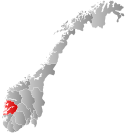Hålandsdal is a former municipality in the old Hordaland county, Norway. The 131-square-kilometre (51 sq mi) municipality existed from 1903 until 1964. It encompassed the eastern part of what is now Bjørnafjorden Municipality in Vestland county. It included the large lakes Skogseidvatnet and Gjønavatnet and all of their surrounding valleys. The administrative centre of the municipality was the village of Holdhus where the Holdhus Church is located.[2]
Hålandsdal Municipality
Hålandsdal herad | |
|---|---|
| Haalandsdal herred (historic name) Haalandsdalen herred (historic name) | |
 Hordaland within Norway | |
 Hålandsdal within Hordaland | |
| Coordinates: 60°14′N 05°49′E / 60.233°N 5.817°E | |
| Country | Norway |
| County | Hordaland |
| District | Midhordland |
| Established | 1 Jan 1903 |
| • Preceded by | Fusa Municipality |
| Disestablished | 1 Jan 1964 |
| • Succeeded by | Fusa Municipality |
| Administrative centre | Holdhus |
| Area (upon dissolution) | |
• Total | 131 km2 (51 sq mi) |
| Population (1963) | |
• Total | 534 |
| • Density | 4.1/km2 (11/sq mi) |
| Time zone | UTC+01:00 (CET) |
| • Summer (DST) | UTC+02:00 (CEST) |
| ISO 3166 code | NO-1239[1] |
History
editOn 1 January 1903, the parish of Hålandsdal (historically spelled Haalandsdalen) was separated from the municipality of Fusa to form a separate municipality of its own. Initially, Hålandsdal had a population of 647.[3]
It was a small municipality and so in the early 1960s, the Schei Committee recommended that it be merged with two of its neighbors: Fusa and Strandvik. So, on 1 January 1964, Hålandsdal was merged with Strandvik and most of Fusa, creating a new, larger municipality of Fusa. Prior to the merger, Hålandsdal had a population of 528.[3]
Name
editThe municipality (originally the parish) is named after the valley that is the site of the old Haaland farm (Old Norse: Hávaland or Háland) since the first Hålandsdal Church was built there. The first element comes from the word hár which means "high" or "tall". The second element is land which means "land". The last element of the name comes from dalr which means "valley" or "dale".[4]
Historically, the name of the municipality was spelled Haalandsdalen. On 3 November 1917, a royal resolution changed the spelling of the name of the municipality to Haalandsdal, removing the definite form ending -en.[5] On 21 December 1917, a royal resolution enacted the 1917 Norwegian language reforms. Prior to this change, the name was spelled Haalandsdal with the digraph "aa", and after this reform, the name was spelled Hålandsdal, using the letter å instead.[6][7]
Government
editDuring its existence, this municipality was governed by a municipal council of directly elected representatives. The mayor was indirectly elected by a vote of the municipal council.[8]
Municipal council
editThe municipal council (Heradsstyre) of Hålandsdal was made up of 13 representatives that were elected to four year terms. The party breakdown of the final municipal council was as follows:
| Party name (in Nynorsk) | Number of representatives | |
|---|---|---|
| Local List(s) (Lokale lister) | 13 | |
| Total number of members: | 13 | |
| Party name (in Nynorsk) | Number of representatives | |
|---|---|---|
| Local List(s) (Lokale lister) | 13 | |
| Total number of members: | 13 | |
| Party name (in Nynorsk) | Number of representatives | |
|---|---|---|
| Local List(s) (Lokale lister) | 12 | |
| Total number of members: | 12 | |
| Party name (in Nynorsk) | Number of representatives | |
|---|---|---|
| Local List(s) (Lokale lister) | 12 | |
| Total number of members: | 12 | |
| Party name (in Nynorsk) | Number of representatives | |
|---|---|---|
| Local List(s) (Lokale lister) | 12 | |
| Total number of members: | 12 | |
| Party name (in Nynorsk) | Number of representatives | |
|---|---|---|
| Labour Party (Arbeidarpartiet) | 5 | |
| Local List(s) (Lokale lister) | 7 | |
| Total number of members: | 12 | |
| Note: Due to the German occupation of Norway during World War II, no elections were held for new municipal councils until after the war ended in 1945. | ||
See also
editReferences
edit- ^ Bolstad, Erik; Thorsnæs, Geir, eds. (26 January 2023). "Kommunenummer". Store norske leksikon (in Norwegian). Kunnskapsforlaget.
- ^ Store norske leksikon. "Hålandsdal" (in Norwegian). Retrieved 14 July 2014.
- ^ a b Jukvam, Dag (1999). Historisk oversikt over endringer i kommune- og fylkesinndelingen (PDF) (in Norwegian). Statistisk sentralbyrå. ISBN 9788253746845.
- ^ Rygh, Oluf (1910). Norske gaardnavne: Søndre Bergenhus amt (in Norwegian) (11 ed.). Kristiania, Norge: W. C. Fabritius & sønners bogtrikkeri. pp. 74 and 192.
- ^ "Norsk Lovtidende. 2den Afdeling. 1917. Samling af Love, Resolutioner m.m". Norsk Lovtidend (in Norwegian). Kristiania, Norge: Grøndahl og Søns Boktrykkeri: 1057–1065. 1917.
- ^ "Norsk Lovtidende. 2den Afdeling. 1917. Samling af Love, Resolutioner m.m". Norsk Lovtidend (in Norwegian). Oslo, Norway: Grøndahl og Søns Boktrykkeri: 1000. 1917.
- ^ Den Nye rettskrivning : regler og ordlister (in Norwegian). Kristiania, Norge: Den Mallingske Boktrykkeri. 1918.
- ^ Hansen, Tore; Vabo, Signy Irene, eds. (20 September 2022). "kommunestyre". Store norske leksikon (in Norwegian). Kunnskapsforlaget. Retrieved 1 January 2023.
- ^ "Kommunevalgene og Ordførervalgene 1959" (PDF) (in Norwegian). Oslo: Statistisk sentralbyrå. 1960. Retrieved 16 February 2020.
- ^ "Kommunevalgene og Ordførervalgene 1955" (PDF) (in Norwegian). Oslo: Statistisk sentralbyrå. 1957. Retrieved 16 February 2020.
- ^ "Kommunevalgene og Ordførervalgene 1951" (PDF) (in Norwegian). Oslo: Statistisk sentralbyrå. 1952. Retrieved 16 February 2020.
- ^ "Kommunevalgene og Ordførervalgene 1947" (PDF) (in Norwegian). Oslo: Statistisk sentralbyrå. 1948. Retrieved 16 February 2020.
- ^ "Kommunevalgene og Ordførervalgene 1945" (PDF) (in Norwegian). Oslo: Statistisk sentralbyrå. 1947. Retrieved 16 February 2020.
- ^ "Kommunevalgene og Ordførervalgene 1937" (PDF) (in Norwegian). Oslo: Statistisk sentralbyrå. 1938. Retrieved 16 May 2020.